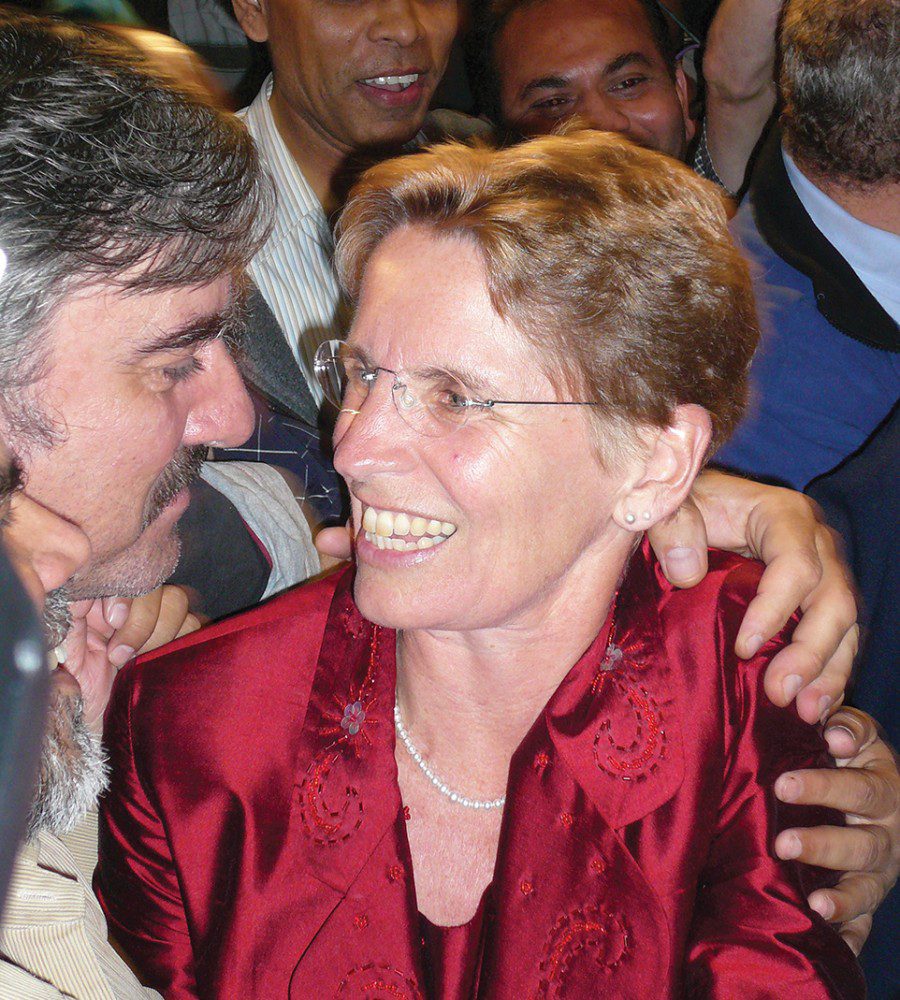Don Valley West MPP Kathleen Wynne won the leadership of Ontario’s governing Liberals tonight, and will be Ontario’s first female premier, and the first openly gay one.
Wynne became premier-designate when she beat her main rival, Sandra Pupatello, on the third ballot of the party’s leadership convention at Maple Leaf Gardens.
She spoke only briefly after her win tonight, saying, “This is going to be a great government. We are going to build on the legacy of Dalton” — referring to retiring Premier Dalton McGuinty.
But the incoming premier faces an uphill battle to stay premier. She inherits a minority government. Her party is trailing both the Conservatives and the New Democrats in the polls. And the Liberals have alienated some traditional supporters, like public school teachers who are angry about the province’s imposed contract. About 20,000 teachers and other union members made that point clear with a massive mid-day rally outside the Gardens.
The results of the first ballot, announced this morning, had Pupatello leading Wynne by only two votes among the delegates from across the province, 599-597. Gerard Kennedy, a former Liberal MPP and MP, followed with 281 and Mississauga-Erindale MPP Harinder Takhar pulled in 235. Mississauga South MPP Charles Sousa had 222 votes and St. Paul’s MPP Eric Hoskins came in last with 150, meaning that he was dropped on the second ballot.
Pupatello opened up her lead in the second round with 817 votes. Wynne held second place with 750. But then the tide turned in Wynne’s favour, when both Sousa and Kennedy walked across the hall to Wynne, symbolically throwing their support to her. That left just the two women on the final ballot, with Wynne having clear momentum.
At around 8:40 p.m., the results were announced: 1,150 votes for Wynne, 866 for Pupatello.
“I am delighted, and I hope you can see it,” Pupatello said in her concession speech. “When I see my Ontario Liberal Party coming together for a spectacular candidate, I am thrilled for us.”
“I want to say thank you to Sandra for your energy, for your passion, for your commitment to the party,” Wynne replied. “I’m going to need you.”
In her final campaign speech this morning, Wynne surprised some by referring to her sexual orientation, asking “Is Ontario ready for a gay premier?” She said the answer is yes, because “this province has changed.” She cited the acceptance of her orientation by the voters of Don Valley West as proof.
Wynne was first elected in Don Valley West in 2003. The riding includes the northwestern third of East York. Wynne is 59 years old, has three children, and lives with her spouse, consultant Jane Rounthwaite.
While Wynne’s election represents two firsts — Ontario’s first female and first openly gay premier — she is not the first premier from the East York area. That was George Stewart Henry, who was a farmer in East York before becoming first a member of the provincial legislature for the riding then known as York East and then premier of the province from 1930 until 1934.
In a campaign interview with the Observer before the convention, Wynne was asked about her priorities if she won.
“I want to try to govern,” she said. “I would propose we put together a throne speech and we finalize a budget, and we go back to the legislature and attempt to govern. I would want to have a quick, but complete discussion about what goes into the budget, and what problems we are facing. I would work with the opposition leaders to get support to implement the budget.
The Observer also asked her about the alienation between the Liberals and some of its traditional constituencies.
“I describe myself as a progressive,” she said. “I really believe government is a force for good in our communities. I’m very interested in resolving issues that have developed between us and teachers, and the broader public sector. I’m not the type of person who believes it’s the best idea to impose public sector agreements, for example. My hope would be that there are collective agreements in place and we won’t have to impose legislation in the new session. I think that we have been in very difficult economic times; we had to make some very difficult economic decisions. Those of us at the table really grappled with that. Some of the processes around those decisions haven’t been what they could have been and the premier has acknowledged that, and so my hope would be that we can repair those relationships, and then put in better relationships going forward.”

